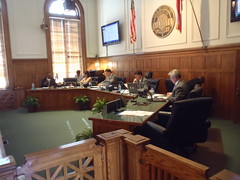 The Valdosta City Council regular meeting is tonight.
You remember them, the council
that may or may not be able to say whether or not they can or cannot
speak during, at the end of, or after their council meetings.
Tonight they appoint people to boards that decide who can put up how big a sign, and that spend millions in your tax money.
The Valdosta City Council regular meeting is tonight.
You remember them, the council
that may or may not be able to say whether or not they can or cannot
speak during, at the end of, or after their council meetings.
Tonight they appoint people to boards that decide who can put up how big a sign, and that spend millions in your tax money.
 I want to see if Mayor Fretti will keep to his word to
expand the Wiregrass Solar plant.
I want to see if Mayor Fretti will keep to his word to
expand the Wiregrass Solar plant.
Also, maybe now this city council can do what Gretna, Florida, did: put out a proclamation saying there will be no biomass plant. Or they could sit on their hands some more and wait until some Sonny finds a way to do it anyway.
 They have lots of other stuff on their
agenda
for tonight, including an appointment to the
Zoning Board of Appeals (ZBOA),
and an appointment to the
Valdosta-Lowndes County Parks & Recreation Authority.
They have lots of other stuff on their
agenda
for tonight, including an appointment to the
Zoning Board of Appeals (ZBOA),
and an appointment to the
Valdosta-Lowndes County Parks & Recreation Authority.
ZBOA decides on variances to Valdosta’s LDR and Lowndes County’s ULDC, including sign variances, much to the annoyance of some local entitled rich people and of McDonald’s.
 Parks & Rec receives 1.5 mil of tax money, about $4.5 million dollars a year,
more than the
Valdosta-Lowndes County Industrial Authority (VLCIA).
Parks and Rec board members get to spend that tax money that you pay.
Parks & Rec receives 1.5 mil of tax money, about $4.5 million dollars a year,
more than the
Valdosta-Lowndes County Industrial Authority (VLCIA).
Parks and Rec board members get to spend that tax money that you pay.
Continue readingAGENDA
REGULAR MEETING OF THE VALDOSTA CITY COUNCIL
5:30 PM Thursday, June 9, 2011
COUNCIL CHAMBERS, CITY HALL









